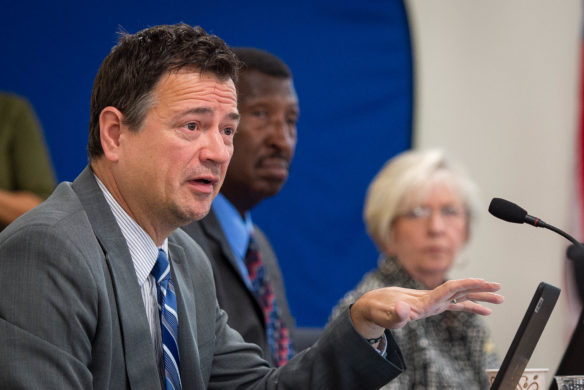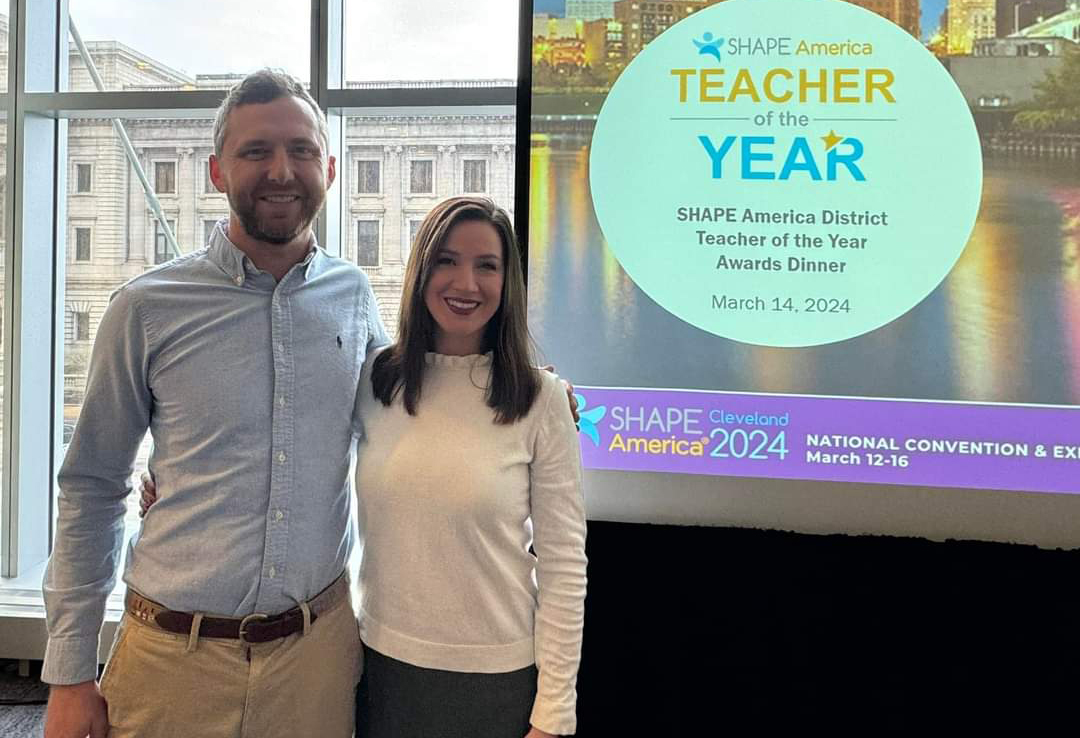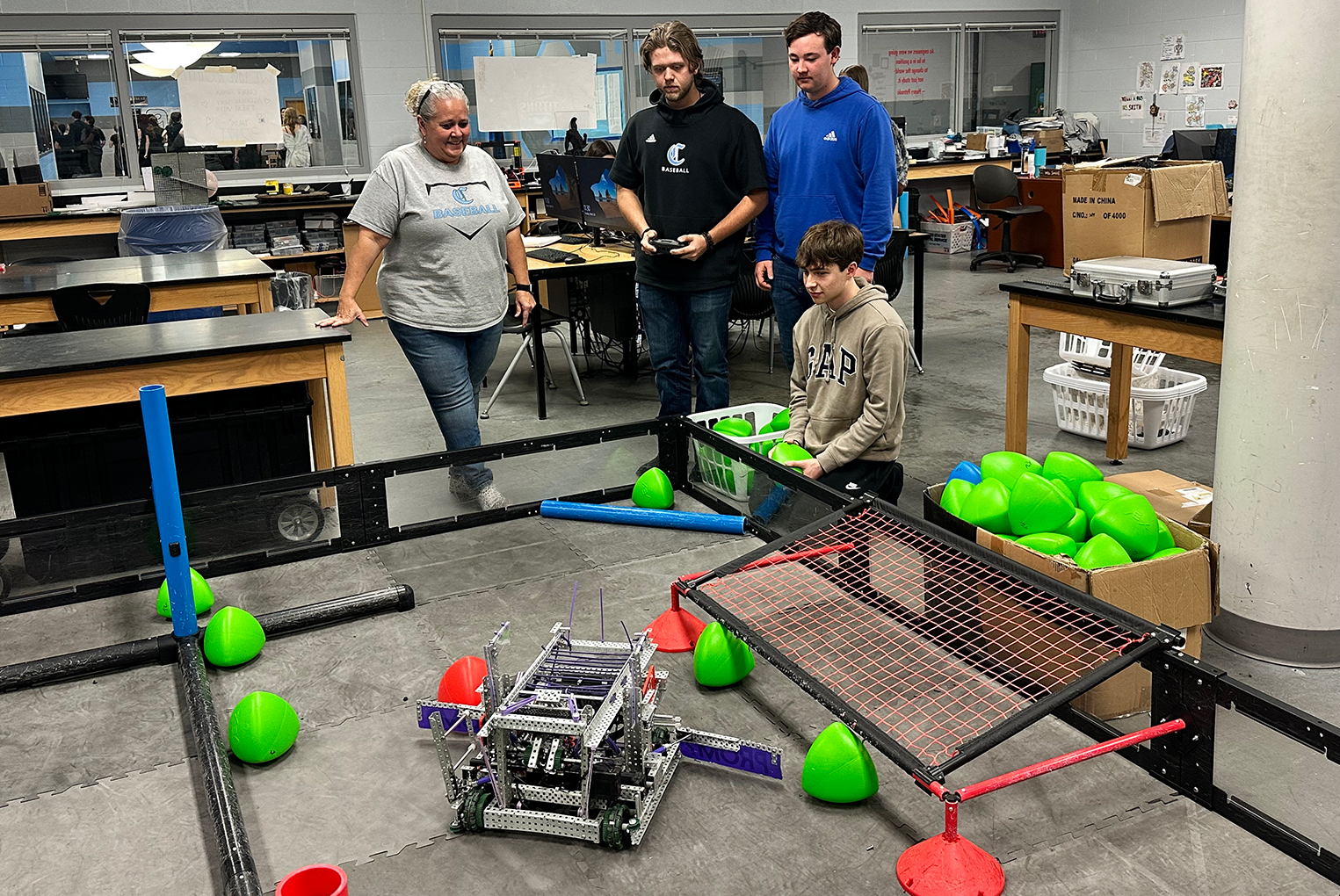
Gary Houchens, a Bowling Green resident, is an associate professor in the Department of Educational Administration, Leadership and Research at Western Kentucky University. Houchens was one of five new members sworn into the Kentucky Board of Education in June.
Photo by Bobby Ellis, Oct. 5, 2016
By Jennifer Ginn
Jennifer.ginn@education.ky.gov
Gary Houchens has spent his career in education, so an appointment to the Kentucky Board of Education seemed like a natural fit.
The Bowling Green resident is an associate professor in the Department of Educational Administration, Leadership and Research at Western Kentucky University. Houchens recently was awarded the 2016 Western Kentucky University Faculty Award for Excellence in Student Advising from the College of Education and Behavioral Sciences.
But Houchens is no stranger to the K-12 classroom. He is a former principal and district administrator in Simpson County, and served as a teacher in the Warren and Bourbon county school systems. He has served as a teacher, assistant principal and principal in Catholic schools in Kentucky and Indiana. Additionally, Houchens served as the Simpson County Schools’ Teacher Quality and Leadership Development coordinator, facilitating teacher and administrator training sessions for improved curriculum development, assessment, instructional strategies and additional aspects of effective teaching and school management.
Houchens earned a doctorate in educational leadership from the University of Louisville, a master’s degree in teaching from Oakland City University, and a master’s degree in history and bachelor’s degree in philosophy and religion from Western Kentucky University.
Kentucky Teacher staff had a chance recently to ask Houchens about his priorities while serving on the Kentucky Board of Education. Here’s what he had to say.
Why were you interested in serving on the Kentucky Board of Education?
“Education is my life’s work and great passion. While there are certain limits to the impact education policy can have on the quality of local schools, I do believe policy can make a huge difference in shaping the work lives of teachers and administrators and the experience of students. So I look forward to participating in those policy discussions.”
What impact do you hope to have on the board?
“I hope my 20 years as a teacher, school administrator and professor of educational leadership will bring an important practitioner’s perspective to board discussions. Additionally, I hope I can leverage my longstanding commitment to school improvement and education reform in helping shape policy that will accelerate student learning.”
What personal trait will serve you best as a board member?
“I believe my knowledge about school leadership and education policy and my passion for school improvement will be assets.”
Other than more money, what do Kentucky schools need most?
“We need a stronger instructional vision on the part of school and district leaders. We need leaders with a clear instructional vision for their schools, a vision of what high-quality teaching and learning looks like that is so strong and so compelling that even if the state changes the curriculum or testing or accountability, the school will keep its steady focus on transforming classroom practices and doing what’s best for students.”
What are the biggest challenges facing Kentucky’s schools?
“Today’s global economy leaves no room for low-skilled workers. We now have to educate all children for an unprecedented level of content knowledge, critical thinking and virtuous citizenship. We have to reimagine schooling for the 21st century and provide a far more personalized and flexible learning experience for our students that is nevertheless rigorous and challenging. I believe articulating and implementing these new forms of schooling is our biggest and most important challenge.”
What small change would have the greatest impact on Kentucky’s schools?
“In recent years, we’ve seen a shift in elementary education toward an almost exclusive emphasis on reading and math. I believe students actually will build stronger reading comprehension and math skills by exposure to a rigorous, content-rich curriculum, even in the early grades. I’d like to see more emphasis on social studies, science and the arts in the elementary curriculum. I believe this would have a positive impact on student learning, especially for students from disadvantaged backgrounds.”
What major change would you make to improve Kentucky schools?
“One thing I’ve learned in my 20 years in education is that no school, no matter how strong, can meet the needs of every single student. That’s why I believe every family should have access to a wide variety of high-quality schooling options, regardless of their income level or ZIP code. Kentucky lags behind the vast majority of other states in this regard. While it isn’t within the authority of the Board of Education to make this happen, I believe the most important change we could make for our students is to adopt a full menu of school choice options, including charter schools, education savings accounts and scholarship tax credits.”
Who was your favorite teacher and why?
“Several teachers from both high school and college come to mind. What they all shared was an infectious passion for their content and an intense personal interest in their students. That combination seemed to be what drew me to them and caused me to learn so much in their classes – and inspired me to also become a teacher!”
Other than parents and teachers, what do you believe has had the biggest impact on Kentucky students’ education in the past few years?
“The accountability focus in recent years has had an enormous impact on Kentucky education in both positive and negative ways. The emphasis on improving student performance and closing achievement gaps has been a huge positive. Schools pay far more attention to early interventions for students who are struggling and – to a lesser extent – enrichments for students who excel. That’s a direct result of our accountability focus.
“But we’ve also seen a shift toward over-emphasizing test preparation and squeezing out curricula that don’t appear to make the biggest impact on accountability measures. Hopefully with the federal Every Student Succeeds Act, we now have an opportunity find a better balance in instruction and curriculum while holding on to our commitment to improve student achievement.”
What have you been reading lately?
“Most recently, I read ‘The Fractured Republic: Renewing America’s Social Contract in the Age of Individualism’ by Yuval Levin. The author argues that our two major political parties are out of touch with ordinary Americans because their policy proposals are rooted in an unhealthy and unrealistic nostalgia for the past. He advocates a renewal of social and political life on the local level to help heal our divisions and focus our energies in more productive ways.
“Right now I’m reading J. D. Vance’s book, ‘Hillbilly Elegy: A Memoir of a Family and Culture in Crisis,’ which describes the author’s journey from Appalachian poverty to professional and personal success as a Yale-trained attorney and Marine Corps veteran. Both books have huge implications for education policy and those who work with children and families of poverty.”
What else would you like Kentucky’s educators to know about you?
“I’m aware that what I say and write can often sound critical of our education system. And I do believe that significant improvements are in order. Our schools are, in fact, getting better but the rate of improvement is so slow we will never meet the economic and cultural challenges Kentucky now faces. This is not a critique of the dedicated, hard-working teachers and administrators who toil away trying to improve student learning.
“I believe we have structural and policy barriers in our system that hamper the efforts of innovative educators to make the kind of impact they otherwise might. I want those educators to know that I support them and believe we have the human capacity to meet any challenge. I’ll do my part to change those policies and remove the barriers to unleash their enormous potential.”



Leave A Comment